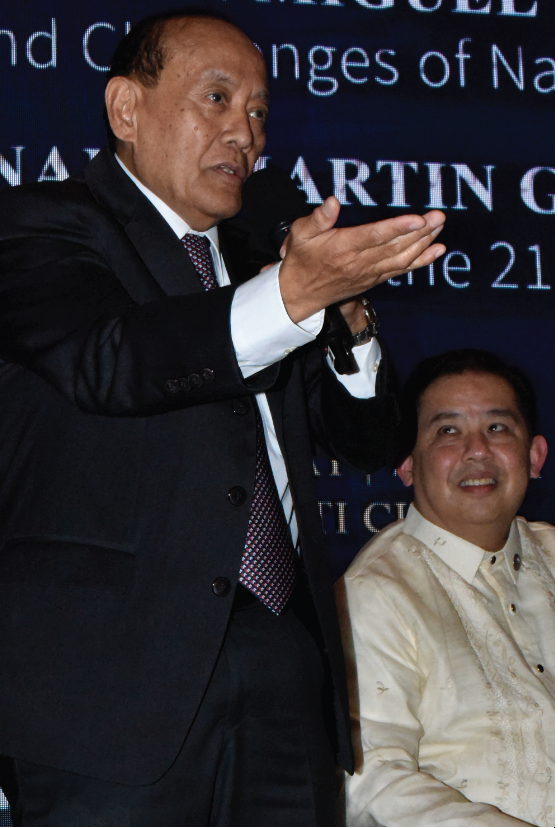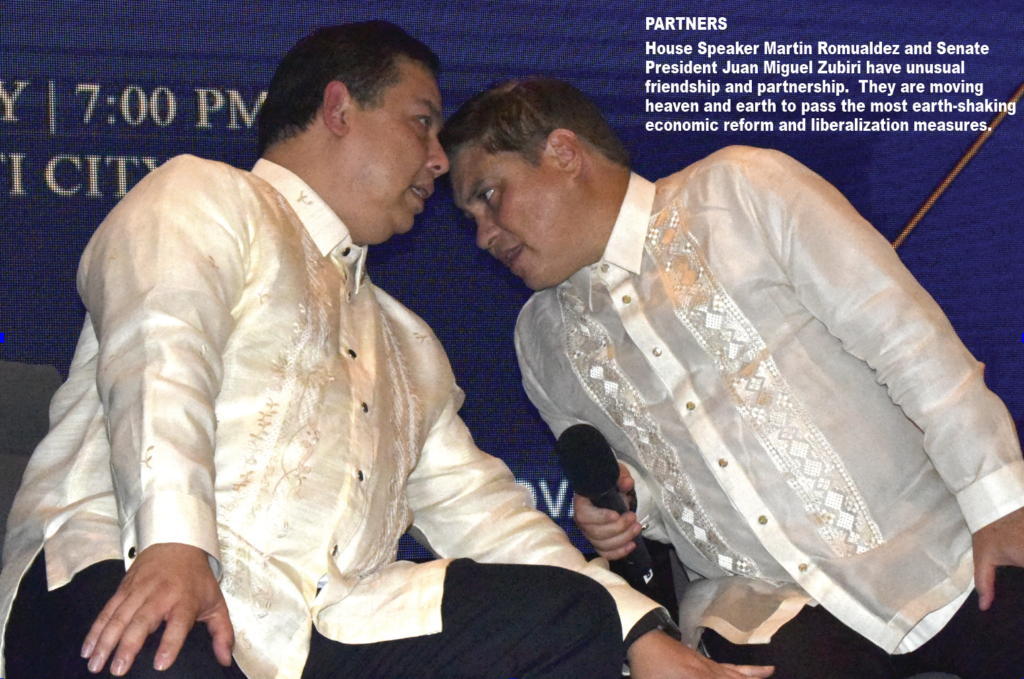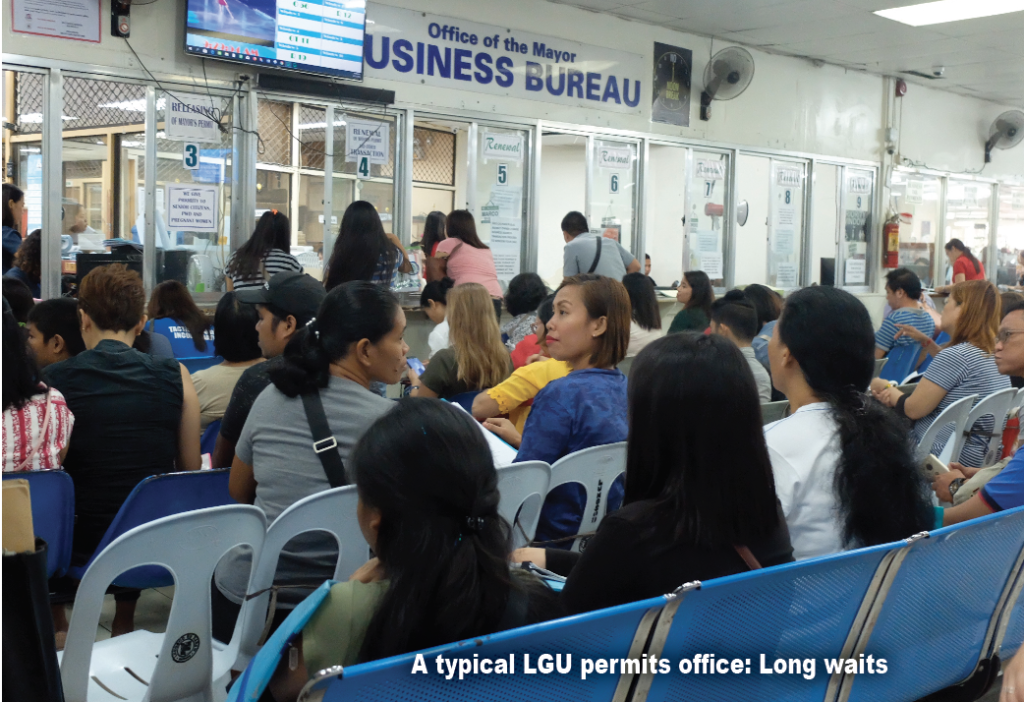By Tony Lopez
Ten minutes. That is the commitment I was trying to wangle from Senate President Juan Miguel Zubiri and House Speaker Ferdinand Martin G. Romualdez on how long an investor can get a business permit.
It takes only 10 minutes to get a business permit in Canada and Singapore.
In New Zealand, it’s zero minute for a business permit. No permit is needed to start a business in kiwi land. In Canada, if you use your legal name, a permit is not needed to start a business.
Migz and Martin were my honored guests at the first ever “Philconsa Day and Senate Night” organized by the Manila Overseas Press Club (MOPC), Tuesday night (Sept. 26). Congress has scuttled VP Sara’s intelligence funds.
Over 250 guests—from business, diplomatic, legal, and media community, spent good money and three hours to hear the latest in economic reform legislation and policy-making.
All SONA bills to be passed
Migz and Martin have promised to pass by this December all 20 urgent bills sought by PBBM in his July 2023 State of the Nation Address (SONA).
The Singaporean ambassador corrected my 10 minutes to 15 minutes.
So I asked Migz and Martin if they could force the LGU mayors to issue business permits in 15 minutes flat. They were non-committal but are mesmerized by the idea.
Seven days
Migz and Martin seem happy enough that it now takes only seven days to get a business permit in most LGUs.
Thanks to red tape and corruption, among the six major ASEAN countries (Indonesia, Malaysia, Singapore, Thailand, Vietnam and the Philippines), our country has been last—in foreign investments, GDP growth per capita income and growth rate, exports, unemployment rate (the highest), poverty incidence (the highest), and inflation rate (the highest).

In my welcome remarks Tuesday night, I said:
Today, we celebrate unity, we celebrate democracy. We celebrate achievements.
For the first time in the long history of our republic, four major institutions of democracy are gathered tonight – to break bread, to share a passion, to divine a future.
The Philippine Constitution Association was formed 78th years ago to protect and defend the basic law of the land.
The Manila Overseas Press Club was established in 1945 with the arrival of the foreign correspondents who came with General Douglas MacArthur. MOPC seeks to promote press freedom and democratic dialogue.
The Philippines today is among the Top 7 most dangerous countries for journalists. And I am not even talking of AI or the Ukraine war.
We have the leaders of the Senate and the House of Representatives with us tonight. Press freedom and democracy are intimately related.
One cannot flourish without the other. The legislature, on the other hand, symbolizes the freedom of the people to elect their representatives. Election means freedom of choice, freedom of expression.

Role of the legislature
The legislature’s oversight and investigative powers (note confidential and intelligence fund or CIF) are essential to good governance.
Its power of the purse (note confidential and intelligence fund) guarantees the means to finance growth.
All these rights are writ in stone called the Constitution, the body of principles that makes a nation whole. And democratic. And great.
Ironically, the Constitution, our Constitution is often blamed for the defects in our democracy, for the seeming lack of robust progress while our neighbors are growing by leaps and bounds.
The OECD’s Foreign Direct Investment Regulatory Index ranks the Philippines third in the world for being the worst among 84 countries surveyed.
PH very restrictive
The FDI Index gauges the restrictiveness of a country’s FDI rules by looking at the four main types of restrictions on FDI: Foreign equity limitations; screening or approval mechanisms; restrictions on the employment of foreigners as key personnel; and operational restrictions, e.g. restrictions on branching and on capital repatriation or on land ownership.
Martin has noted that investment restrictions on foreign ownership range from requiring at least 60% Filipino ownership to total prohibition.
The Constitution prohibits foreign ownership in mass media and allows only 30% foreign capital in advertising agencies and 40% in educational facilities.
Education
In the education sector, foreign ownership caps prevented the Philippines from hosting topnotch universities seeking to establish a presence in Asia.
The result is that our 15 year-olds are rated the most stupid young people on earth, in terms of reading, math and science.

Stupid young people
They don’t know how to read. If they can, they do not understand what they are reading. They cannot count beyond 20. They don’t know the how and why of things.
Compared with the performance of its Asian neighbors, the Philippine economic decline has been breathtaking in its depth and breadth.
In 1975, the Philippines was the third richest country in Asean, behind only Singapore and Malaysia.
In 2000, the Philippines had become the fourth richest country in the ASEAN region in terms of per capita GDP or the value of the economy in current US dollars divided by the population.
In 2000, the Philippines had a per capita GDP of $1,090—half of that of Thailand ($2,000) but 1.25x that of Indonesia ($870), and 2.19x that of Vietnam ($498). Malaysia was 4x richer ($4,350) while Singaporeans were 21.9x richer than the Filipinos.
The Philippines is a great country. It has had centuries of contact with China, today, its enemy.
It proclaimed Asia’s first republic in 1898. It established Southeast Asia’s first bank and central.
It established Asia’s first modern water and sewerage system. It built Southeast Asia’s first modern Cultural Center, and its first world class Philippine International Convention Center.
It established the region’s first toll expressways and its first elevated expressways. Today, the Philippines is last among the six major countries of Asean.
When Singapore began in 1965, it had no water, no toilets, no resources. Today, its income is 22x that of the Philippines.
